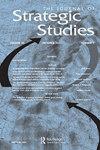From the editors
IF 2
2区 社会学
Q2 INTERNATIONAL RELATIONS
引用次数: 0
Abstract
We would like to welcome Chiara Libiseller to the editorial team of The Journal of Strategic Studies. We are excited to have her join us as Deputy Editor. We would similarly like to extend our deepest appreciation to Joshua Rovner for his years of service as Deputy Editor and to Alan James for his tenure as the journal’s Reviews Editor. In recent years, as evidence of China’s nuclear and conventional buildup has grown, so too has concern over the prospects of escalation stemming from the entanglement of Chinese nuclear and conventional weapon systems. In ‘Are They Reading Schelling in Beijing? The Dimensions, Drivers, and Risks of Nuclear-Conventional Entanglement in China’, David C. Logan of Princeton University develops a framework for assessing entanglement and its risks. Applying that framework to China, he finds that Beijing’s missiles are not as entangled as is sometimes feared. He argues that strategic signaling and perception management will be key to controlling escalation risks stemming from nuclear-conventional entanglement in China. The issue’s next three essays examine the topics of strategic culture and military innovation. In ‘Theory of Strategic Culture: An Analytical Framework for Russian Cyber Threat Perception’, Martti J. Kari of the University of Jyväskylä and Katri Pynnöniemi of the University of Helsinki formulate an analytical framework to study the formation of Russian thinking on cyber threats as part of Russian strategic culture. They identify a sense of vulnerability, the narrative of Russia as a besieged fortress, and the technological inferiority of Russia as specific factors influencing Russian cyber threat perceptions.来自编辑
我们欢迎Chiara Libiseller加入《战略研究杂志》的编辑团队。我们很高兴她能成为我们的副主编。同样,我们也要向多年来担任副主编的Joshua Rovner和担任杂志评论编辑的Alan James表示最深切的感谢。近年来,随着中国核武器和常规武器建设的证据越来越多,人们对中国核武器和常规武器系统纠缠所导致的升级前景的担忧也越来越多。在《他们在北京读谢林的书吗?》《中国核常规纠缠的维度、驱动因素和风险》一书中,普林斯顿大学的David C. Logan开发了一个评估纠缠及其风险的框架。将这一框架应用于中国,他发现北京的导弹并不像人们有时担心的那样纠缠不开。他认为,战略信号和感知管理将是控制中国核常规纠缠带来的升级风险的关键。本期接下来的三篇文章探讨了战略文化和军事创新的主题。在《战略文化理论:俄罗斯网络威胁感知的分析框架》中,Jyväskylä大学的Martti J. Kari和赫尔辛基大学的Katri Pynnöniemi制定了一个分析框架,以研究俄罗斯作为俄罗斯战略文化一部分的网络威胁思维的形成。他们认为,影响俄罗斯网络威胁认知的具体因素包括脆弱感、俄罗斯被围困堡垒的叙事,以及俄罗斯的技术劣势。
本文章由计算机程序翻译,如有差异,请以英文原文为准。
求助全文
约1分钟内获得全文
求助全文
来源期刊

Journal of Strategic Studies
Multiple-
CiteScore
4.00
自引率
5.30%
发文量
40
期刊介绍:
The defining feature of The Journal of Strategic Studies is its commitment to multi-disciplinary approach. The editors welcome articles that challenge our historical understanding of man"s efforts to achieve political ends through the application of military and diplomatic means; articles on contemporary security and theoretical controversies of enduring value; and of course articles that explicitly combine the historical and theoretical approaches to the study of modern warfare, defence policy and modern strategy. In addition to a well-established review section, The Journal of Strategic Studies offers its diverse readership a wide range of "special issues" and "special sections".
 求助内容:
求助内容: 应助结果提醒方式:
应助结果提醒方式:


